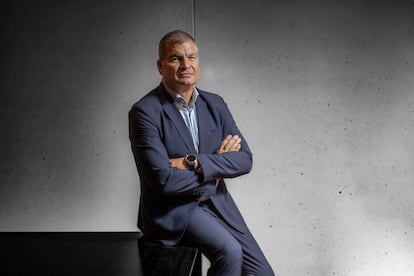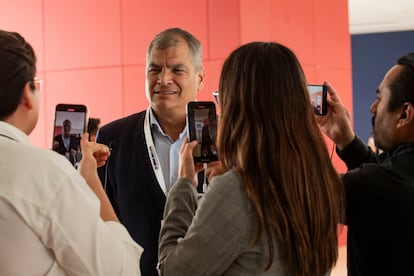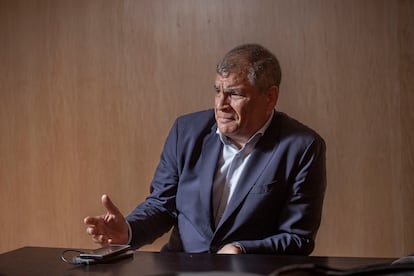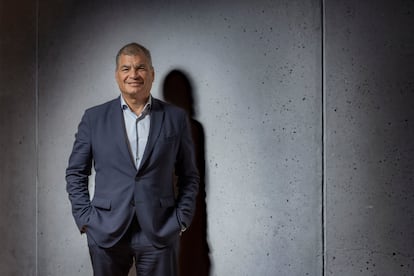Rafael Correa: ‘The Ecuadorian government is infiltrated by organized crime’
The former president argues that his opponents will not be able to defeat his candidate, Luisa González, in the presidential runoff on October 15


Rafael Correa, 60, is convinced that opponents of Correismo — the political movement built around him — were behind the murder of Ecuadorian presidential candidate Fernando Villavicencio on August 9. According to the former president of Ecuador, Villavicencio was assassinated as part of a strategy to prevent the Citizen Revolution Movement from winning the elections in the first round held on August 20. He doesn’t hesitate — not like when he has to choose between the regular Coca-Cola and the sugar-free one an assistant gives him during the interview. Villavicencio “was more useful dead than alive,” he says.
The founder of the Citizen Revolution Movement receives EL PAÍS in a room at the International Museum of the Baroque in Mexico, where the last forum of the Puebla Group was held, the space that brings together representatives of the Latin American political left. Correa is also convinced that — even though polls put businessman Daniel Noboa ahead of his candidate Luisa González — the Citizen Revolution Movement has “all the conditions to win” in the runoff on October 15. But, he warns, the anti-Correismo movement will “use all their resources to stop that victory.”

Question. After the municipal elections and the results obtained in the general elections, what is the electoral situation of your party?
Answer. We have all the conditions to win, they know this, and they are going to use all their resources to prevent this popular victory. You saw it in the first round. We were going to win. We had 42 to 44% [to win outright in the first round, a candidate needs 50% of the vote, or to have at least 40% with a 10-point lead over the closest opponent]. Our nearest rival had 19% and they knew it. They murdered a candidate who was in fourth or fifth place, a staunch rival of ours, but who served them more dead than alive. They blamed us for that murder, they made us fall nine points and we won the first round, but with 33%. We didn’t win in the first round so that everyone would unite against us in the runoff. Despite all that, I believe that we have the opportunities to win, but we have to be very alert because they are going to use all their resources to prevent that victory.
Q. What do you think happened with the murder of Fernando Villavicencio?
A. They have arrested the perpetrators, this case should have been resolved. They’re up to something, why are they taking so long? We have information that it is the government that is infiltrated by organized crime, with that organized crime. The question is: why did they kill him 11 days before the elections? To prevent our electoral victory as well.
Q. How did the murder affect the campaign?
A. It disrupted the entire electoral atmosphere. Something like this had never been seen before. With all due respect, we thought this was something that happened in Colombia during the time of Pablo Escobar, in Mexico in the 1990s during the drug violence, but it had never happened in our country. You saw candidates with bulletproof vests, journalists with bulletproof vests. It was an atmosphere of terror. It is very difficult to hold normal elections in that atmosphere of terror, because people’s feelings are so strong they cannot reflect; rather, they respond instinctively and defensively.
Q. Is Ecuador facing a resurgence of Correismo?
A. I don’t want to be unkind. I have never liked the word Correismo, but they created that political or sociopolitical category. They never managed to crush us, we were always the first political group. Why do you think they won’t let me return? [Correa moved to Belgium in 2017 and has not returned to Ecuador due to a corruption conviction, which he says is a case of political persecution.]
If we were not strong, and at a timely moment, they should let me return. Let them defeat me at the polls and bury me politically. They know we won convincingly. They stole our political party from us, with the betrayal of [former president] Lenín Moreno. [But we will win] despite that betrayal, despite the fact that for six years, they have maintained mono-themed discourse that says that we are corrupt, that we are drug traffickers, that everything was broken. Trying to convince people that when we were good, we were bad. When I left the country, it was the second safest in Latin America. Do you know what they said? We made pacts with the mafias. If we made a deal with the mafias, we should have been the number one cocaine exporter in Europe and we were nothing. Now we are the number one exporter of cocaine in Europe.
Q. The polls place Luisa González behind Noboa. Are you confident that she will win the elections?
A. Tell me what polls [put her behind]. We are following 1,000 cases daily and we are in a technical tie with trends that go up and others that go down. We know that there is a hidden vote. I have the firm conviction that we are at the top and not only that, we are going to finish at the top, which is the most important thing.
Q. Were you surprised that Noboa made it to the runoff?
A. I’m not surprised by the support he has. It is the support of all the powers that be, from the press, everything is united against us.

Q. Can Noboa unite the anti-Correismo vote?
A. There is a group of people who are willing to vote for anyone but us. That group is increasingly a minority, but the press bombardment continues. That is why there is also our ability — albeit on an uneven playing field — to show the lies they are telling. We are fighting against a gigantic campaign of infamy. More than support for Noboa, it is the anti-Correismo that has been inoculated all these years.
Q. What advice are you giving Luisa González for the remainder of the campaign?
A. She is the one who is guiding the campaign, I don’t have to give her advice. She knows very well what she has to do.
Q. González has said in different interviews that you would be her main advisor if she ends up governing...
A. To govern, not in the elections. And to govern she doesn’t need my advice either, but one can contribute something with one’s experience.
Q. In the hypothetical case that Luisa González becomes president, what influence would you have in that government?
A. Luisa has had the generosity to say that I would be her main advisor, I know the responsibility that I have on my shoulders. If I can help with anything, I will be there.
Q. González has also been firm regarding her position on abortion. Is it progressive to reject decriminalizing abortion in cases of rape, as the candidate did?
A. That’s what I don’t understand. Now being progressive [means ticking] a checklist: [being in favor of] abortion, gay marriage. Since when? Our main priority is through socioeconomic construction. It’s how the left was born. We have not yet resolved these serious socioeconomic contradictions, and we are focusing on these aspects. Someone will say that rights are not being negotiated, well, we must define what are rights and what are not.
That is one of the problems of the left, which is made up of many identity groups: feminism, LGBTQ+, animal activists, environmentalists, indigenous people who aim to dominate the agenda, even though their main problems are not those of the majority. That’s on a political level. On a moral level, I also object to abortion, but that does not make me not a progressive. If [Chilean dictator Augusto] Pinochet was in favor of abortion, does that make him progressive? If Che Guevara was against abortion, was he not progressive? Let’s define what progressivism means. I define it as seeking socioeconomic justice.
Q. The new government will only govern for the remaining 18 months of the term. Is that enough time to tackle the challenges Ecuador is facing?
A. No, not at all. Because the challenge is to no longer be underdeveloped, and that takes decades. We were on that path, they betrayed us and I have not seen, correct me if I’m wrong, such rapid and profound destruction of a country in times of peace. It hasn’t happened. We are going to make rapid improvements, but we aren’t going to solve everything. At least we won’t continue falling back.
Q. Would you call a Constituent Assembly to declare invalid the 2018 referendum that prevented your re-election?
A. You review the referendum. [It was] illegal through and through. How are they going to keep quiet about this tremendous legal monstrosity? That’s going to collapse one day and if it doesn’t collapse, well, I don’t aspire for anything for myself. In any case, why a Constituent Assembly? With all the state taken over by these people, they are most likely not going to let our government govern. We are not going to allow this, and if necessary we will hold a Constituent Assembly to govern with our people.
Q. If you lose the runoff, what is your plan for the 2025 elections?
A. If there is still a country left, to beat them [laughs animatedly].

Sign up for our weekly newsletter to get more English-language news coverage from EL PAÍS USA Edition
Tu suscripción se está usando en otro dispositivo
¿Quieres añadir otro usuario a tu suscripción?
Si continúas leyendo en este dispositivo, no se podrá leer en el otro.
FlechaTu suscripción se está usando en otro dispositivo y solo puedes acceder a EL PAÍS desde un dispositivo a la vez.
Si quieres compartir tu cuenta, cambia tu suscripción a la modalidad Premium, así podrás añadir otro usuario. Cada uno accederá con su propia cuenta de email, lo que os permitirá personalizar vuestra experiencia en EL PAÍS.
¿Tienes una suscripción de empresa? Accede aquí para contratar más cuentas.
En el caso de no saber quién está usando tu cuenta, te recomendamos cambiar tu contraseña aquí.
Si decides continuar compartiendo tu cuenta, este mensaje se mostrará en tu dispositivo y en el de la otra persona que está usando tu cuenta de forma indefinida, afectando a tu experiencia de lectura. Puedes consultar aquí los términos y condiciones de la suscripción digital.








































